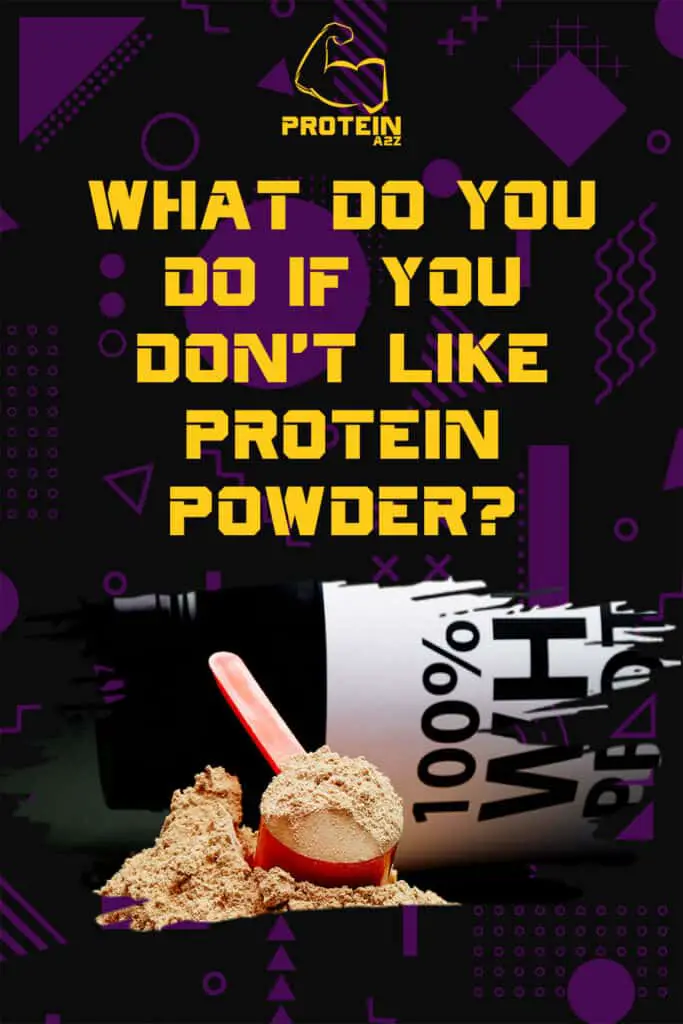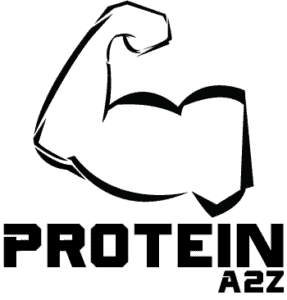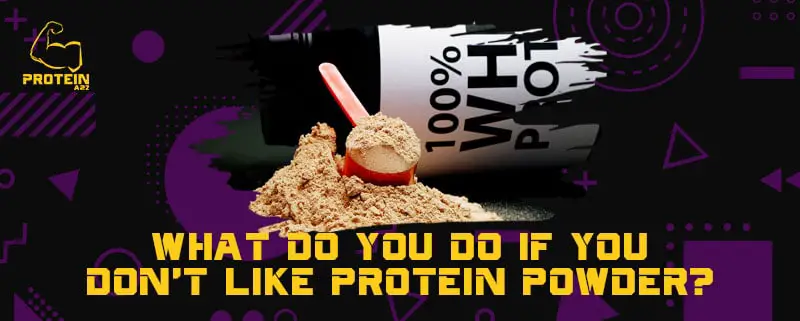So, you have been putting thought into your diet and have decided you needed to up your protein intake. The only problem is that you don’t like protein powder. What to do?
Using protein powder in your diet can be a quick and cheap way to up your protein intake without causing too much stress. However, some people have said that they don’t like protein powder. Here are some things you can try if you have any of the following aversions to protein powder.
Table of Contents
You don’t like the way it makes you feel
Some people don’t like protein powder mix due to the way it makes them feel. This usually means it makes them feel bloated and/or gassy. This can be due to a range of different ingredients.
Therefore, the first option is to switch brands. You can often get a sample of smaller sizes if you want to try a few brands.
Whey protein is the most common type of protein on the market. However, whey concentrate can wreak havoc on your system as it contains high amounts of lactose. The good thing is that you can still use whey; you just need to try an isolate.
Isolate protein powders basically strip the protein of everything that is not protein, resulting in a more pure powder with very little or no lactose.
If it’s still a problem, try a vegan protein. These will obviously not contain any lactose and are generally better tolerated by more people.
Have you tried an egg based protein powder?
You don’t like the taste
With all of the flavors and types of protein powder on the market, it’s hard to imagine that you can’t find a protein whose taste you don’t like. You may just need to try different brands.
Optimum Nutrition is continuously rated high for taste. It has a wide range of flavors, including toasted coconut, chocolate malt, white chocolate, peanut butter, and classics such as French vanilla and milk chocolate.
BSN Syntha-6 is another brand that is constantly rated high for taste.
If you have been using water with your mix, try using milk. Milk can add a creamier taste to your protein shake and make a world of difference in the taste. You can also add other ingredients such as oats and peanut butter in a blender to help with the flavor complex.
Remember, you don’t have to sip on a protein shake for hours. You just need to find a combination that’s good enough to drink.
You Don’t Like Drinking It
One popular option is to make “proats”. This is done by mixing protein powder into a bowl of oats and milk. This can make for a delicious breakfast. Because the protein is mixed with the oats and milk, the taste is much less potent.
Tip: Make a bowl the night before and put it in the fridge until morning. Overnight “proats” are delicious!
- Can you add protein powder to a cake mix
- The best way to drink protein powder
- What to use instead of protein powder when you bake
FAQs about protein sources
Are there any convenient alternatives to drinking protein drinks?
If you REALLY don’t like protein powder, your last option for high-quality protein in a convenient form is to try protein bars of some sort. They are much more expensive than protein powder, but they are still very convenient because you can literally take them with you when you leave your house.
What foods are high in protein?
If you still can’t find anything, you will just need to include high-quality protein products in your diet. This can include any animal products, particularly meats and dairy products. Perhaps the most similar “real food” to protein powder is Greek yogurt.
Greek yogurt is very high in protein, up to 15g, and as convenient to eat as a protein shake. You just need a spoon! Other than that, try to include at least a serving (20-25g) of protein at every meal.
How much protein do I need a day?
The recommended daily amount of protein people need is 0.8 grams of protein per kilogram of bodyweight. However, if you compete in sports or engage in resistance training, you will need more to help support with repair and recovery. You should aim for 1.4-2.0 g per kg.

User comment about how to mix in protein powder, so you don’t notice
How I Learned to Drink Protein Powder – Simple Steps To Help You Learn
A question that is often asked about a whey protein powder is how I learned to drink protein powder. I am not a big fan of water in my diet, and one thing about whey that I really like is that I don’t get hungry as often.
However, it can be hard to find protein shakes in your local supermarket or health food store, which is why I started learning to drink protein powder. I have heard a lot of different people say things like, “you should never drink milk”I just got the protein powder in a box”.
A great idea to learn how to drink protein powder
However, in order to answer this question “How I learned to drink protein powder”, I will need to explain exactly what protein powder is, how it works, and why you need it. Protein powder is made up of two primary ingredients; whey and casein.
Whey protein is more commonly found in many health food stores and in the milk aisle of grocery stores. It is the highest quality protein that can be found and comes from a dairy product. In order to make this type of protein powder, the milk and whey are mixed together in a large bowl until they are separated. If you want to make your own protein powder, you can easily do this by combining casein and water.
After I learned how to drink protein powder, I discovered that I never feel hungry. I can eat nearly anything, as long as I get some protein. My skin looks and feels much healthier than it did before I started taking whey.
I accomplish more
I can get more sleep than I ever thought I would, and it has allowed me to accomplish many things that I was afraid to do before. I know that I owe all of this to the wonderful benefits that protein powder provides for me. I also hope that you will try it and reap the same rewards that I do.

